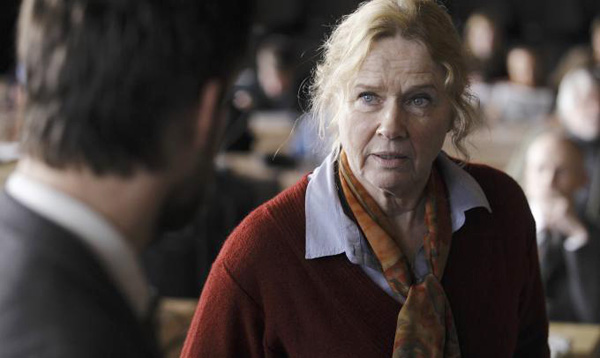Two Lives starts out looking like the usual spy thriller, as Katrine (Juliane Köhler) deftly switches wigs and outfits in traveling from Norway to the final days of East Germany, where she burns archival evidence from an abandoned orphanage and coolly directs a contact to eliminate witnesses. As she changes identities, her troubled past haunts her. This German/Norwegian co-production, with actors from both countries (a couple of the Germans learned Norwegian for their roles), puts a very personal face on the impact of dastardly deeds that link World War II and the Cold War in both countries.
Back home in coastal Norway, Katrine just barely manages to divert the suspicions of her naval officer husband about her last-minute travel. Then she turns into a modern professional woman juggling work (as a photo editor) and family responsibilities while sharing childcare for the baby of her law student daughter, Anne (Julia Bache-Wiig), with her mother, Ase (Liv Ullmann).
But there’s an unsettling complication to her plans, based on real events that are unfamiliar to most American audiences. A young lawyer, Sven Solbach (Ken Duken), persistently importunes Katrine and Ase to join him in a lawsuit for reparations, first against the Norwegian government then at the European Court of Human Rights. As a result of the suit, Ase is embarrassed into confessing to her granddaughter that she was one of the thousands of Norwegian women who were in relationships with German soldiers during the five years of Nazi occupation and who suffered doubly for those relationships.
After the war, Ase and some 5,000 such women were rounded up into labor camps, which were shockingly worse than the more familiar post-liberation images of ostracized French women enduring humiliations and jeering gauntlets. A lasting symbol of Norwegians’ revulsion for that time period is that Quisling, the name of the country’s leader during the occupation, has become an international synonym for collaborator.
What was even more heartbreaking to Ase was that the Nazis had taken away to Germany the child she had with the soldier as part of Heinrich Himmler’s Lebensborn program. While most films inaccurately portray the program as the licentious breeding of the super race, the beautiful Ullmann, in what is billed as her first major (albeit supporting) film role in more than 10 years, effectively embodies the discomfiting reality that Nazi ideology saw blonde, blue-eyed Nordic women as the ideal Aryan model. (Ullmann says it will be her last film role.) Ase’s claim that the affair caused her lover to be sent off to the Eastern Front as punishment seems the only false note, as such relationships were encouraged for eugenics purposes.
Most of the 10,000 or more resulting children were sent to special German institutions (and some to adoptions), which led to a postwar trial in Nuremburg. The leaders were acquitted of kidnapping, and most of the records were destroyed, so only a small number of families could be reunited. Katrine was one of the few to successfully find her birth mother almost 20 years later.
At least that’s what it seems. As the lawyer keeps insisting on more corroboration to make their case stronger, Katrine’s carefully organized life starts to fall apart along with the Berlin Wall. In the tantalizing flashbacks, Katrine’s reunion appears to have been orchestrated by intelligence chief Hugo (Rainer Bock) to infiltrate her as a spy into Norway—and the production design of the secret security offices exactly matches the preserved Stasi Headquarters Museum in Berlin.
While the family repercussions and the lawyer’s flirtation with Anne veer toward emotional melodrama, the gradual unraveling of Katrine’s identity is suspenseful and sympathetically reveals the true pain of being an abused pawn of the losing sides of history. Two Lives resonates like other hidden-identity thrillers, such as Anatole Litvak’s Anastasia (1956), crossed with TV’s The Americans. It was also short listed for this year’s best foreign language film Academy Award.







This is an outstanding film, one of the best I have ever seen.